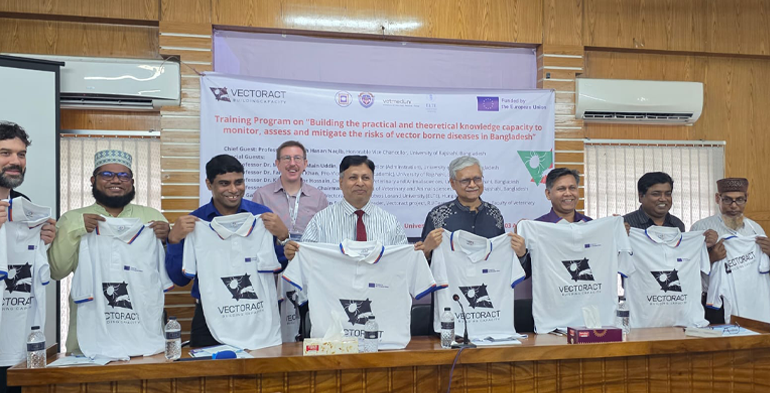
Agrilife24.com: The Vectoract Project, Funded by the European Union organized the team of University of Rajshahi today 3 August inaugurated a significant four-day Field Training program focused on combating arthropod vectors and the pathogens they transmit. Titled "Investigating Arthropod Vectors and Vector-Borne Pathogens: One Health Concept," the training runs from August 3rd to 6th, 2025.
The event was graced by esteemed university leadership, including: The Chief Guest, Professor Dr. Saleh Hasan Naqib, Honourable Vice-Chancellor of the University of Rajshahi, formally inaugurated the training program and the special guests were Professor Mohammad Main Uddin, Pro-Vice-Chancellor (Administration), RU; Professor Md. Farid Uddin Khan, Pro-Vice-Chancellor (Academic), RU; Professor Dr. KM Mozaffor Hossain, Dean, Faculty of Veterinary and Animal Sciences, RU; Professor Dr. Moizur Rahman, Chairman, Department of Veterinary and Animal Sciences, RU; Dr. Gabor Kemensi, Coordinator of the VECTORACT Project and Professor Md. Akhtar Hossain Mazumder, Administrator of the Public Relation Office, RU. The occation Chaired by Professor Dr. Md. Jalal Uddin Sarder, Team Lead of the VECTORACT Project (RU).
The event, hosted University of Rajshahi, marks the second field training (Field Training 2 - RU Part) under the VECTORACT Project. This international collaborative initiative aims to build capacity in the critical field of vector-borne disease (VBD) surveillance and research, firmly grounded in the integrated One Health approach recognizing the interconnection of human, animal, and environmental health.
The inauguration ceremony commenced with a welcome address by Professor Dr. Md. Jalal Uddin Sarder, Team Lead of the VECTORACT Project (RU) and Founder Dean of the Faculty of Veterinary and Animal Sciences. Professor Sarder emphasized the urgency of addressing vector-borne diseases in Bangladesh and the region, highlighting the training's role in equipping professionals with cutting-edge knowledge and practical skills. Dr. Gabor Kemensi, Coordinator of the VECTORACT Project and Director of the National Laboratory of Virology at Eötvös Loránd University (ELTE), Hungary, addressed the gathering. Dr. Kemensi outlined the project's global objectives and the importance of international collaboration and hands-on training in tackling the complex challenges posed by VBDs.
The Chief Guest, Professor Dr. Saleh Hasan Naqib, Honourable Vice-Chancellor of the University of Rajshahi, formally inaugurated the training program. He underscored the university's commitment to research addressing national health priorities and lauded the VECTORACT Project for fostering international partnerships and advancing the One Health paradigm in Bangladesh. The training session immediately following the inauguration focused on refreshing theoretical knowledge of vector-borne diseases. The afternoon session delved into the global significance of the One Health concept, providing concrete examples of its application in combating infectious diseases.
Distinguished participation includes faculty members and students from both the University of Rajshahi (10 students, 3 faculty from Veterinary & Animal Sciences) and the Chittagong Veterinary and Animal Sciences University (10 students, 3 faculty). Key VECTORACT Project team members present include Dr. Abdullah Al Mamun Bhuyan and Dr. Md. Hemayatul Islam (RU), Dr. Nurul Islam (Country Representative, Bangladesh), Mr. Hens Petter (Country Representative, Austria), and Professor Nelli (international representative).
"This training is a vital step in strengthening our national capacity to monitor and respond to emerging vector-borne disease threats. The One Health approach, bringing together veterinary, medical, and environmental expertise, is essential for effective prevention and control strategies." - Professor Dr. Md. Jalal Uddin Sarder, Team Lead VECTORACT (RU) & Founder Dean, FVAS, RU. "The VECTORACT Project thrives on collaboration. Bringing together students and faculty from multiple Bangladeshi institutions with international experts creates a powerful learning environment to advance practical skills in vector and pathogen surveillance, crucial for safeguarding public health." - Dr. Gabor Kemensi, Coordinator, VECTORACT Project & Director, National Laboratory of Virology, ELTE, Hungary.
About the VECTORACT Project: The VECTORACT Project is an international research and capacity-building initiative focused on arthropod vectors and vector-borne pathogens. It emphasizes a One Health approach, fostering collaboration between institutions like Eötvös Loránd University (ELTE), Hungary, the University of Rajshahi, Bangladesh, and other partners to enhance surveillance, research, and response capabilities for vector-borne diseases impacting human and animal health.
























